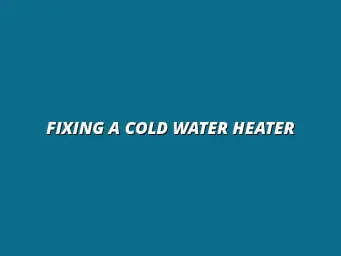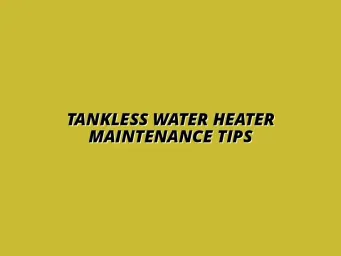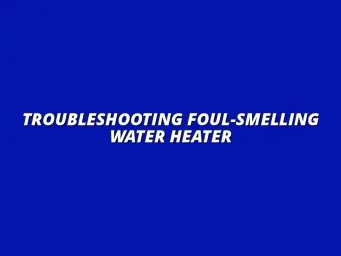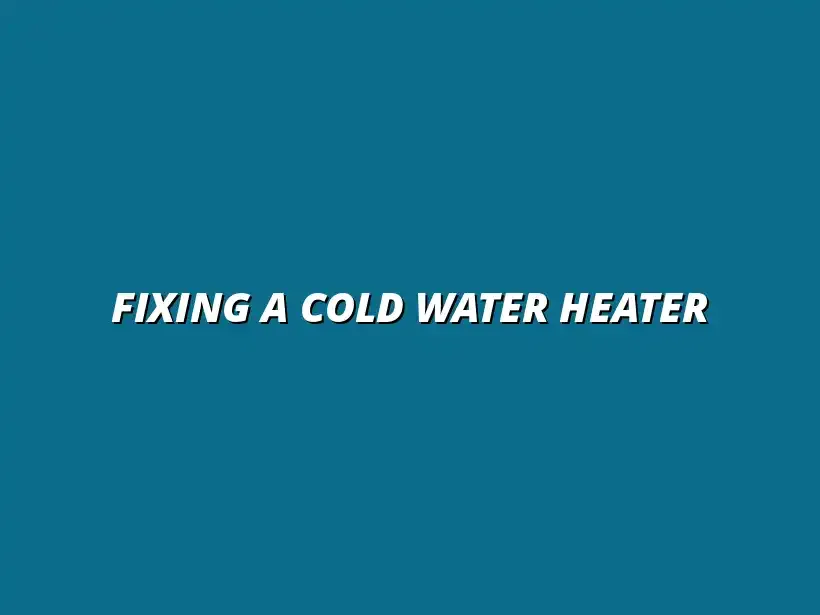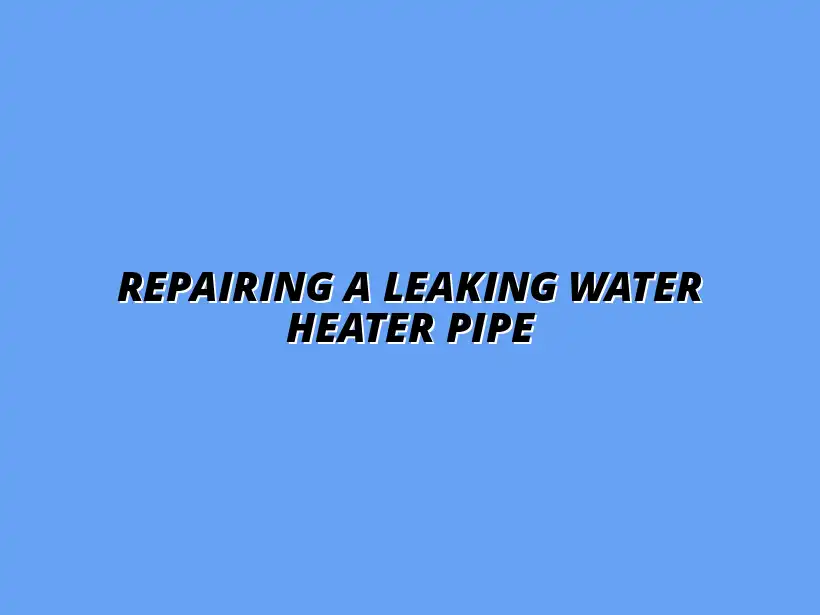
Repairing a Leaking Water Heater Pipe
Understanding Water Heater Pipe Leaks
Water heater pipe leaks can be a homeowner's nightmare! They not only waste water but can also lead to significant damage if not addressed promptly. In this guide, I’ll explore the common causes of these leaks, helping you understand how to recognize and deal with them effectively.
Common Causes of Water Heater Pipe Leaks
There are several reasons why you might experience a leak in your water heater's pipes. Understanding these can help you take preventative measures in the future. Here’s a look at some of the most **common causes of water heater pipe leaks**:
- Corrosion and Ageing of Pipes
- Improper Installation and Maintenance Issues
- Temperature Fluctuations and Pressure Issues
Corrosion and Ageing of Pipes
Over time, pipes can corrode due to various factors, including the minerals in water and the quality of the pipe material itself. When pipes age, they can develop tiny cracks or holes that eventually lead to leaks. This is especially true for older homes where plumbing systems may not have been updated for years.
To combat this, I always recommend scheduling regular inspections, particularly if your home has older plumbing. Addressing these issues before they become significant problems can save you time and money!
Improper Installation and Maintenance Issues
Another common culprit behind water heater leaks is poor installation practices. If your water heater was not installed correctly, it can lead to problems down the line. Furthermore, lack of maintenance can exacerbate these issues, allowing small leaks to develop into larger, more costly repairs.
Making sure to hire experienced professionals, like the team at Plumb Pro Care, can significantly reduce the risks associated with improper installation. Regular maintenance checks can also help catch small issues before they turn into disasters!
Temperature Fluctuations and Pressure Issues
Temperature changes can put stress on your water heater's pipes. If the water temperature is too high, it can lead to expansion in the pipes, which may cause them to crack or develop leaks. Similarly, high water pressure can also lead to leaks, especially if your plumbing isn’t equipped to handle it.
It’s a good practice to monitor your water heater’s settings regularly. Maintaining consistent temperature and pressure not only extends the life of your pipes but also promotes energy efficiency. Don’t hesitate to reach out for help if you’re unsure about the settings!
Identifying the Type of Leak
Once you’ve recognized the presence of a leak, the next step is identifying its source. Understanding where the leak is coming from can help determine the appropriate course of action. Let’s dive into how you can distinguish between different leak sources.
Distinguishing Between Different Leak Sources
Not all leaks are the same, and knowing the type can guide your repairs. Here are the primary sources of water heater leaks:
- Leak from the Hot Water Supply Line
- Leak from the Cold Water Supply Line
- Leak at the Drain Valve or Fittings
Leak from the Hot Water Supply Line
If you notice water pooling around your water heater, it might be a leak from the hot water supply line. This could result from a loose connection or a corroded pipe. Identifying this early can prevent significant water damage to your home.
One way to check is to feel the pipes. If one is significantly hotter than the others and has moisture around it, you might be dealing with a hot water supply line leak!
Leak from the Cold Water Supply Line
Similar to hot water lines, the cold water supply line can also develop leaks. These leaks may be less apparent because the water is cooler, but they can still cause damage. The signs include water accumulation near the base of the water heater.
Inspecting the cold water line regularly can save you from later headaches. Be proactive and check for any changes in the water pressure, which could indicate a leak.
Leak at the Drain Valve or Fittings
Leaks can also occur at the drain valve or the fittings connected to your water heater. If you notice dripping water here, it could mean the valve is faulty or the connections are loose. Tightening fittings may solve the problem but replacing parts might be necessary if they're worn out.
Always exercise caution when dealing with the drain valve, especially if the water heater has been in use. This is where knowing your equipment and having the right tools comes into play.
Preventative Measures for Future Issues
To keep our water heaters in top shape, it’s essential to focus on preventative measures. This not only saves time and money in the long run but also ensures your home remains comfortable. Regular maintenance can significantly reduce the risk of pipe leaks and other plumbing issues down the line.
One effective way to maintain your water heater is through consistent inspections. By regularly checking pipes and connections, we can catch small issues before they turn into significant problems. I recommend looking for signs of wear and tear, as even minor rust can lead to larger leaks later on.
Regular Maintenance Tips for Water Heaters
Here are some practical tips for keeping your water heater healthy:
- Check the temperature setting regularly to ensure it’s not too high.
- Flush the tank annually to remove sediment buildup.
- Inspect pipes for corrosion and leaks at least twice a year.
- Test the pressure relief valve to ensure it’s functioning correctly.
Maintaining optimal temperature and pressure helps not just in conserving energy but also in prolonging the life of your water heater. Sometimes, simple adjustments make all the difference!
Benefits of Maintaining Optimal Temperature and Pressure
Maintaining an appropriate temperature and pressure in your water heater can lead to various benefits. Firstly, it can enhance energy efficiency, helping to reduce your utility bills. Secondly, it minimizes the risk of pipe leaks caused by extreme conditions, keeping your home safe and dry.
Moreover, a well-maintained water heater operates more efficiently, which can save you from costly repairs and replacements. Remember, a little effort goes a long way in preventing future issues!
Addressing Common Questions about Water Heater Pipe Leaks
As a plumber, I often get asked about water heater pipe leaks and how to handle them. It’s vital for homeowners to understand their options when faced with such issues. This knowledge can guide you in making the best decision for your home.
Can I Repair a Leaking Water Heater Pipe Myself?
Many people wonder whether they can tackle this task on their own. DIY repairs can save money, but there are factors to consider before diving in.
- Do you have the necessary skills and tools for the job?
- Is the leak minor or major? Major leaks may require professional help.
- Are you comfortable working with plumbing systems?
Always err on the side of caution, especially if you’re unsure about something. Your safety and the safety of your home are paramount!
When to Call a Professional Plumber
If you’re facing a significant leak or feel unsure about the repair process, it’s best to call in a professional. At Plumb Pro Care, our team handles these situations daily and provides quick, effective solutions to any plumbing problem.
Don't hesitate to reach out, especially if you notice signs of water damage or if water pressure changes unexpectedly. We’re here to help you 24/7!
What Are the Costs Associated with Water Heater Pipe Repairs?
Understanding the potential costs involved is crucial for planning and budgeting. The costs can vary widely based on several factors, such as the extent of the damage, materials needed, and labor fees.
Estimating DIY Repair Costs
- Sealant and tape: $10 - $30
- Replacement parts (pipes, valves): $20 - $100
- Tools (if needed): $30 - $200
While DIY repairs can be more affordable, it’s essential to assess whether they are a wise choice based on your skills and the situation!
Understanding Professional Service Fees
If you decide to hire a professional, be aware of the costs. Depending on the complexity of the repair and the plumber's rates, you may expect to pay:
- $100 - $300 for minor repairs
- $300 - $1,000 for more extensive damage
At Plumb Pro Care, we strive to provide transparent pricing and quality service without hidden fees. It’s always best to get a quote before proceeding!
Final Thoughts on Water Heater Pipe Maintenance and Repair
Addressing water heater pipe leaks promptly can save you from more significant headaches later on. Regular maintenance not only keeps your water heater functioning efficiently but also helps in avoiding costly repairs down the line.
Importance of Timely Repairs to Avoid Major Issues
It’s crucial to recognize the significance of timely repairs. When leaks are ignored, they can lead to severe water damage, mold growth, and other complications that can affect your home and health.
Taking action at the first sign of a leak can help prevent these problems. A quick call to us at Plumb Pro Care can set you on the right path. We're always ready to assist!
Building a Routine Maintenance Schedule
Creating a maintenance schedule can ensure that you don't overlook essential checks. Regular inspections and preventative measures will help you identify potential issues early and keep your water heater in good condition.
Don’t forget to involve your family in these tasks. Teaching everyone about water heater health can promote responsibility within your home!
Resources for Further Learning
For those looking to dive deeper into water heater maintenance, there are plenty of resources available. Understanding the ins and outs of your plumbing system can equip you with the necessary knowledge to tackle minor issues and make informed decisions.
Recommended Guides and Tutorials on Water Heater Maintenance
- How to Perform Routine Water Heater Maintenance
- Video Tutorials for DIY Repairs
- Articles on Best Practices for Plumbing Systems
These resources can provide a wealth of information. Remember, at Plumb Pro Care, we are always here for any questions or assistance you may need!
Links to Video Demonstrations of Common Repairs
Videos can be incredibly helpful in visualizing repairs! Look for channels that specialize in plumbing tutorials. Watching step-by-step guides can boost your confidence if you decide to undertake a repair yourself.
In summary, maintaining your water heater isn’t just about fixing leaks. It's about creating a safe and efficient home environment for you and your loved ones. Let's keep those pipes flowing smoothly!
